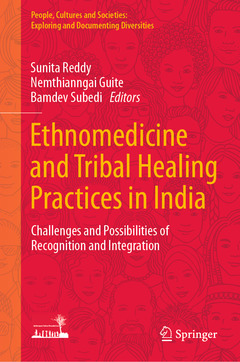Ethnomedicine and Tribal Healing Practices in India, 1st ed. 2023 Challenges and Possibilities of Recognition and Integration People, Cultures and Societies: Exploring and Documenting Diversities Series

Sunita Reddy PhD in Anthropology with two decades of research teaching experience and teaching at Jawaharlal Nehru University for the past 19 years. She has published many research papers in national and international peer-reviewed journals and contributed papers in edited volumes. Her areas of research are disasters, women and child health, medical tourism, surrogacy, ethnomedicine and child abuse. She has presented more than 100 papers in national and international seminars and conferences. She served as Deputy Director (R&D), School of Social Sciences and is an Adjunct Faculty, at the Special Centre for Disaster Research, Jawaharlal Nehru University. She is the author of the book Clash of Waves: Post Tsunami Relief and Rehabilitation in Andaman and Nicobar Islands Indos Publication 2012, editor of the books Marginalisation in Globalising Delhi: Issues of Land, Livelihood and Health Springer 2016, and Editor of The Asian Tsunami and PostDisaster Aid, Springer 2018. She is the Founder and Chairperson of Anthropos India Foundation, a trust, which is a research and policy organisation and Honorary President of SATAT, a national NGO working with Women and Children in New Delhi. She participated in national debates on surrogacy on many national TV channels. She has many awards in sports and co-curricular activities too and recently received the ‘Women Empowerment Award—2021’ on International Women’s day by Delhi State Legal Services Authority and Bhagidari Jan Sahyog Samiti.
Date de parution : 02-2024
Ouvrage de 368 p.
15.5x23.5 cm
Date de parution : 02-2023
Ouvrage de 368 p.
15.5x23.5 cm



